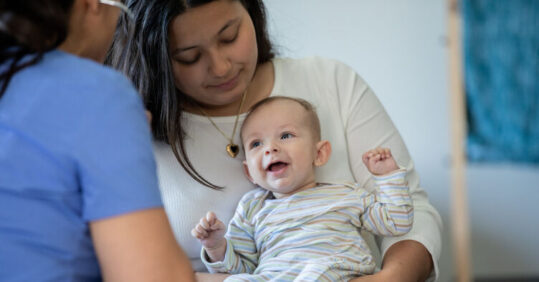Babies and young children are missing out the Government’s promise of a ‘best start in life’ due to the growing impact of poverty, a survey of health visitors has found.
Over 90% of health visitors surveyed reported that there had been an increase in poverty affecting families and an increase in families needing to access foodbanks. Health visitors also reported a troubling increase in perinatal mental illness (83%) and domestic abuse (75%).
Related Article: Antibiotic-resistant gonorrhoea cases on the rise in England
A further 86% reported that there was not enough capacity in other services to pick up onward referrals. This follows reports that children and young people faced significant barriers to accessing mental health services due to a lack of capacity in the NHS.
‘Through their universal reach, health visitors have a privileged and unique view into the lives of babies, young children and their parents/carers across the UK’, said Ms Morton.
Adding that ‘the findings also paint a deteriorating picture of a health visiting workforce under immense pressure as practitioners struggle to meet the scale of rising need. Families are facing the brunt of these challenges with a widening postcode lottery of health visiting support across the UK.’
The iHV’s six recommendations
– Prioritise the first 1001 days of life – a shared cross-government ambition and strategy for the first 1001 days
– A shift towards prevention and early intervention is needed to support all people to lead healthy and fulfilling lives
– Equity of access to support is needed for all babies, children and families across the UK and an end to the current postcode lottery.
– Systems thinking – the benefits of an effective health visiting service accrue to numerous government departments and across a person’s lifetime.
Related Article: Unions urge government to deliver NHS pay increase
– Integrated clinical care pathways with significant ‘front-loaded’ investment in prevention and early intervention.
– Strengthening the health visiting service.
The report also highlighted the impact that a disruption to development during the crucial early years of life can have on the development of a child.
Of those surveyed, 84% said that they had encountered an increase in children with speech, language, and communications delays in their development. A further three-quarters of health visitors reported an increase in child behaviour problems.
Related Article: Take Nursing in Practice’s survey for a chance to win £200 and influence the debate
Ms Morton added that ‘because the first years of life are so important for lifelong health, wellbeing and success, ignoring this tsunami of unmet need being experienced by our youngest citizens risks undermining the life chances of so many children.’
The iHV also used the report to make a number of recommendations to the Government, aimed at reducing the impact of poverty on the development of children.






